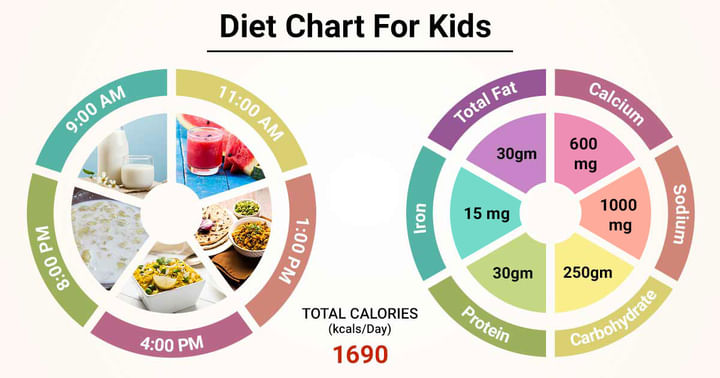Get the App
For Doctors
Login/Sign-up
About
Health Feed
Find Doctors
Diet Chart For kids
Last Updated: Jan 20, 2025
About
Kids are the one who tends to exhaust their energy by extensive physical activities. Kids are still in the high growth stage where consumption of a proper amount of nutrients is inevitable. Parents should consider providing nutrient-dense food which may include protein, fruits, vegetables, grains, dairy, etc. Diet for kids defines their energy level for the entire day and determines future body growth.
Diet for kids should be :
- It should be free from harmful calories like added sugar and trans fats.
- Kids need around 1000 – 1400 Kcal every day. However, as age increases, the required calories also increase.
- Kids should be given fresh fruits and vegetables.
- Fruits should be raw and nutrient-dense.
- Dark green and leafy, red and orange, beans and peas should be served for vegetables along with sprouts for
- Different types of grains should be given in order to have protection from any vitamin and nutrient deficiency.
- Fat-free or low-fat drinks should also be the part of the diet. Milk, 100% pure juice, etc. can boost the energy level.
- Dry fruits are rich sources of energy, they should be given based on the growth and activity level of the kids.
- The diet must not include fried food as it includes saturated and trans-fat which are harmful to a healthy growth.
- Artificial sweeteners should not be included in the diet.
- The diet should be balanced and should be catering to the needs of the kids.
Diet Chart
| Sunday | |
| Breakfast (8:00-8:30AM) | 1 cup milk + 1 tomato and cucumber brown bread sandwich with 1 cheese slice + 1 tsp tomato pureed |
| Mid-Meal (11:00-11:30AM) | 1 cup watermelon/ watermelon juice + nuts |
| Lunch (2:00-2:30PM) | Chapati 2 + Cabbage Curry (1/2 cup) |
| Evening (4:00-4:30PM) | 1 cup milk + 1/2 cup poha |
| Dinner (8:00-8:30PM) | Chapati 1 soaked in Milk(1/2 cup) with jaggery |
| Monday | |
| Breakfast (8:00-8:30AM) | 1 cup milk + 2 potato cheela + 2 tsp tomato chutney |
| Mid-Meal (11:00-11:30AM) | 1 orange + nuts |
| Lunch (2:00-2:30PM) | Chapati 2 + Cauliflower Curry (1/2 cup) |
| Evening (4:00-4:30PM) | 1 cup milk + 1 cottage cheese sandwich |
| Dinner (8:00-8:30PM) | Chapati 1 + Chana Daal (1/2 cup) |
| Tuesday | |
| Breakfast (8:00-8:30AM) | 1 cup milk + 1 cup vegetable macaroni |
| Mid-Meal (11:00-11:30AM) | 1 cup kiwi smoothie + nuts |
| Lunch (2:00-2:30PM) | Chapati 2 + Mixed Veg Curry (1/2 cup) |
| Evening (4:00-4:30PM) | 1 cup rice kheer with jaggery |
| Dinner (8:00-8:30PM) | Chapati 1 + Fish curry (1/2 cup) |
| Wednesday | |
| Breakfast (8:00-8:30AM) | 1 cup milk + 1 besan cheela |
| Mid-Meal (11:00-11:30AM) | 1 cup strawberry smoothie with nuts |
| Lunch (2:00-2:30PM) | Chapati 1 + Soy bean curry (1/2 cup) |
| Evening (4:00-4:30PM) | 1 cup vanila milkshake + 1 cup vegetable upma |
| Dinner (8:00-8:30PM) | Chapati 1 + Rajma (1/2 cup) |
| Thursday | |
| Breakfast (8:00-8:30AM) | 1 cup milk + 1 cup vegetable idli |
| Mid-Meal (11:00-11:30AM) | 1 cup pineapple + nuts |
| Lunch (2:00-2:30PM) | Chapati 1 + Paneer Curry (1/2 cup) |
| Evening (4:00-4:30PM) | 1 cup milk + 1 cup vegetable oats |
| Dinner (8:00-8:30PM) | Chapati 1 soaked in Milk(1/2 cup) with jaggery |
| Friday | |
| Breakfast (8:00-8:30AM) | 1 cup milk + 1 vegetable suji cheela |
| Mid-Meal (11:00-11:30AM) | 1 cup apple + nuts |
| Lunch (2:00-2:30PM) | Chapati 2 + Pumpkin n Potato Curry (1/2 cup) |
| Evening (4:00-4:30PM) | 1 cup strawberry milkshake |
| Dinner (8:00-8:30PM) | Chapati 1 + Chana Daal (1/2 cup) |
| Saturday | |
| Breakfast (8:00-8:30AM) | 1 cup milk + 4-5 pcs cheese pakora |
| Mid-Meal (11:00-11:30AM) | 1 cup mix fruit juice + nuts |
| Lunch (2:00-2:30PM) | Rice (1/2 cup) + Daal (1/3 cup) + Roasted Papad 1 + Chicken/ Fish curry (1/2 cup) |
| Evening (4:00-4:30PM) | 1 cup milk + 1 Veg Pan Cake |
| Dinner (8:00-8:30PM) | Chapati 1 + Fish curry (1/2 cup) |
Food Items To Limit
- Microwave popcorn
- Processed meats
- Canned Tomatoes
- Kid's Yogurt
- Sugary Cereals
- Apple Juice
- Honey
- Soda
- Boxed Mac 'n' Cheese
- Fruit Snacks
- Sports Drinks
- Flash-Fried Frozen Finger Foods
- Raw Milk
Do's And Dont's
Do's & Dont's
- Do set a good example for your child to copy. Share mealtimes and eat the same healthy foods.
- Do discourage snacking on sweets and fatty foods. Keep plenty of healthy foods, such as fruits, raw vegetables, low-fat crackers, and yogurt, around for children to eat between meals.
- Do allow children to follow their natural appetites when deciding how much to eat.
- Do encourage children to enjoy fruits and vegetables by giving them a variety from an early age.
- Don’t give skim or 1-percent-fat milk to children under the age of 5 unless your doctor prescribes it; at this stage, children need the extra calories in whole milk.
- Do ask children to help prepare meals. If parents rely mostly on convenience foods, children may not learn to enjoy cooking.
- Don’t add unnecessary sugar to drinks and foods.
- Don’t accustom children to extra salt by adding it to food or placing the shaker on the table.
- Don’t give whole nuts to children under the age of 5, who may choke on them. Peanut butter and chopped nuts are fine as long as the child is not allergic to them.
- Don’t force children to eat more than they want.
- Don’t use food as a bribe.
- Don’t make children feel guilty about eating any type of food.
Food Items You Can Easily Consume
- Eggs : A fantastic source of protein, eggs are also one of the few foods that naturally contain Vitamin D.
- Dairy : Milk and milk products are important source of carbohydrates, protein and essential vitamins (A, B12, riboflavin and niacin) and minerals, such as – calcium, phosphorus, and potassium.
- Oatmeal : Not only is oatmeal a rich source of protein, it has low fat content!
- Blueberries : It has been known to lower the risk of heart disease and diabetes, and improve brain function.
- Nuts : An assortment of nuts can be a great source of vegetable protein, fiber, vitamins and ‘good’ fats that are important for the growth and development of your child.
- Fish : Fish is a great source of vitamin D & Omega 3 Fatty Acids, which are super important for the proper functioning of your child’s brain and can also reduce the risk of many major diseases.
- All The Greens : Leafy vegetables are high in dietary fibre, folic acid, vitamin C and potassium, and can thus speed up digestion, improve bone health and reduce the risk of major diseases.
References
- Normal Diet for Children - 1 to 11 Years of Age, 2019 [Internet]. drugs.com. [Cited 01 July 2019]. Available from:
- Children's diet - fruit and vegetables. BetterHealth Channel 2019 [Internet]. betterhealth.vic.gov.au. [Cited 01 July 2019]. Available from:
- Nutrition for kids: Guidelines for a healthy diet- Mayo Clinic [Internet]. mayoclinic.org 2017 [Cited 06 August 2019]. Available from:
Book appointment with:
Delhi
Mumbai
Chennai
Bangalore
Index
Table of content
Content Details
Written ByDrx Hina FirdousPhD (Pharmacology) Pursuing, M.Pharma (Pharmacology), B.Pharma - Certificate in Nutrition and Child CarePharmacology
Reviewed By
Find Dietitian/Nutritionist near me
Ask a free question
Get FREE multiple opinions from Doctors
posted anonymously



